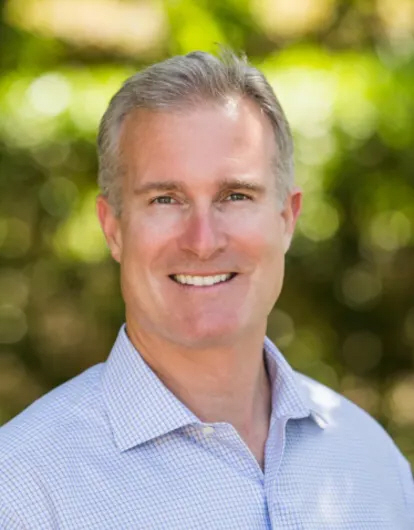Greg Hartmann

Photo courtesy of National Veterinary Associates
NVA chief executive Greg Hartmann is becoming the company's chairman, handing the CEO role to Larry Allgaier (not pictured), a former executive at Mars.
The owner of National Veterinary Associates is shifting its specialty hospitals into a separate business that it plans to list independently on the stock exchange, potentially narrowing NVA's focus to general practice.
NVA controls the third-greatest number of veterinary practices in the world, behind Mars Inc. and IVC Evidensia, having grown at blistering speed since it was acquired in 2019 by JAB, an investment firm.
The German firm is moving 145 NVA specialty and emergency hospitals into the new business, named Ethos Veterinary Health, according to a news release this week. NVA will continue to oversee 1,400 locations primarily consisting of general practices, equine hospitals and boarding sites.
The split comes after NVA last year encountered resistance to its growth ambitions from the U.S. Federal Trade Commission, which forced it to sell 11 specialty and emergency hospitals and placed restrictions on it acquiring more, due to concerns that it had amassed an anticompetitive presence in several geographic locations.
NVA and Ethos, although they'll be operated and managed as separate businesses, will exist as a "combined company" after the split, NVA said. It added, however, that JAB is preparing for initial public offerings (IPOs) of each unit in the next "two to three years," meaning the businesses would be listed on a stock exchange as two distinct companies.
IPOs involve selling shares in a company to a variety of investors, large or small, and quoting those shares on the stock market, where they can be publicly traded. IPOs can be a means for private equity firms to cash in on investments that have become too large to sell to other companies. Still, businesses contemplating an IPO don't necessarily have to sell their entire interest and may elect to hold onto substantial stakes.
Companies listed on the stock market have greater disclosure obligations than private companies. They must, for instance, publicly release key financial information each quarter, such as their profit, revenue, costs and borrowings. The last big owner of veterinary hospitals to be listed on the U.S. stock market was VCA before it was taken private through its acquisition by Mars in 2017.
Speculation has been growing that NVA, IVC Evidensia and other large consolidators, such as Thrive Pet Healthcare, might launch IPOs. Recent stock market turmoil, however, triggered by high inflation, rising interest rates and weakness in the banking sector have made that option less attractive for now.
The split at NVA, which owns practices in the United States, Canada, Australia, New Zealand and Singapore, has been accompanied by leadership changes. Chief Executive Officer Greg Hartmann will assume the role of chairman of the combined company. He will be replaced as CEO by Larry Allgaier, a partner at JAB and a former senior executive at Mars' veterinary business.
Separation comes amid growing regulatory scrutiny
NVA has "tripled in size" since JAB acquired it four years ago, JAB Senior Partner David Bell said in the company news release. NVA said it now generates $6 billion in annual revenue — $4 billion from general practices and $2 billion from specialty hospitals.
JAB has been growing the specialist business rapidly via acquisitions, having bought Compassion First in 2019 and then two other chains — Sage Veterinary Partners and Ethos (with the latter's name adopted for the new business). The FTC allowed all three acquisitions to proceed, on the condition that JAB sold some hospitals in certain locations.
"Now is the time for us, as long-term strategic shareholders, to focus on the next several years of value creation by creating two distinct, leading veterinary businesses, as we prepare for an eventual IPO of each of them," JAB's Bell said.
According to the news release, Ethos will lead "the advancement of cutting-edge medicine," while NVA will "continue to focus on ensuring broad access to high-quality care for all pet owners."
The separation isn't necessarily related to the FTC's recent interventions. Businesses often spin off assets because they believe the market might value them more highly as independent entities.
"We don't see this as anything more than suggesting that the ownership group believes the separation of the businesses will create more long-term value," said Bryan Jaffe, managing director of investment bank Cascadia Capital.
Separating assets also can make them easier to acquire, Jaffe notes, though he doesn't believe JAB is hoisting a "for sale" sign, given its apparent desire to be a long-term investor in NVA.
Tom Elliott, a managing director at investment bank Capstone Partners, agrees investors could see separate growth opportunities in each business. Ethos, for instance, could benefit from the higher margins (the difference between revenue and costs) typically generated by specialist practices. NVA could benefit from less intense regulatory scrutiny, since ownership of general practices in the U.S. is less concentrated than of specialist hospitals.
Elliott said the split might simplify pending discussions with the FTC because they'd no longer be clouded by what type of market share the two respective businesses have in the same geographic location. He also wonders if the regulator will be more reluctant to target publicly owned companies. "It is easy for the regulators when they are punishing 'big bad private equity' but they can find themselves in a slightly different position if 'mom and pop investors' are on the receiving end of their decisions."
It's unclear whether the FTC will start cracking down on proposed acquisitions of general-practice clinics. Across the Atlantic, the United Kingdom's Competition and Markets authority has and continues to intervene in deals involving general-practice clinics. This month, for instance, IVC Evidensia agreed to offload eight British veterinary businesses after the purchases became the subject of a CMA inquiry.